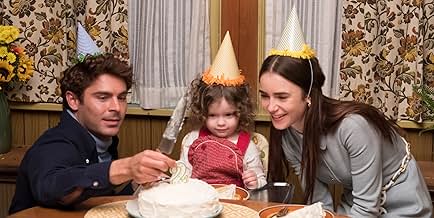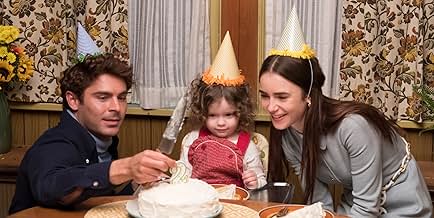Une chronique des crimes de Ted Bundy, du point de vue de sa petite amie de longue date, Elizabeth Kloepfer, qui refusa de croire la vérité à son sujet pendant des années.Une chronique des crimes de Ted Bundy, du point de vue de sa petite amie de longue date, Elizabeth Kloepfer, qui refusa de croire la vérité à son sujet pendant des années.Une chronique des crimes de Ted Bundy, du point de vue de sa petite amie de longue date, Elizabeth Kloepfer, qui refusa de croire la vérité à son sujet pendant des années.
- Réalisation
- Scénario
- Casting principal
- Récompenses
- 5 victoires et 5 nominations au total
- Utah Judge Stewart Hanson
- (as Alan Bomar Jones)
Avis à la une
Firstly, the performances are outstanding across the board. This is the best performance I have ever seen from Zac Efron. As a comedic actor he does very little for me, however this film was proof that as a serious actor he can carry a film entirely on his own. Also Lily Collins impressed me immensely once again. She had already blown me away in 'To the Bone', and once again here (admittedly I didn't actually recognise her due to the normal weight she had in this film) she was captivating to watch every time she was on screen. The final scene these two share together is some acting of the highest quality.
This is not a film that is trying to shock you with grisly murders and over the top characters. It is something very different to that indeed. In fact in terms of action there is almost none, however the 110 minute runtime flies by. The pacing is exquisite, mostly because the dialogue is so well written. I'll be honest, this film caught me off guard by how good it was. If you're on the edge about seeing it, please do. You'll be very happy you did.
It's the - sort of - biography of real life seventies serial killer, Ted Bundy. And, if you're interested in his life then this is definitely going to interest you. Plus it has the - quite bankable - Zac Efron as the titular killer, Bundy and this is where the film starts to draw criticism from some people. They say that, because of Efron's natural good looks and charm, he draws quite a lot of sympathy towards the crazed killer. This may be true, however it's also worth noting that the real life Bundy was also considered attractive and it was his natural charm that allowed him such easy access to his unsuspecting victims, so, in my opinion, the casting is spot on.
In fact, it's Efron that steals the show in his portrayal of the psychopath and this is definitely one for his acting C.V. Now, back to the title again. I've watched other films about Ted Bundy and they were pretty strong stuff, all choosing to show his hideous kills and various crimes. In 'Extremely Wicked, Shockingly Evil and Vile,' unless I'm much mistaken, you don't actually see a single kill. Whereas most other biopics start with the crimes and progress to show Bundy's capture and imprisonment etc, this one pretty much starts off with him getting arrested and the rest is the subsequent trial. Therefore, anyone expecting gore and violence will be sorely let down by the title.
The rest of the cast all play their parts well, including Lily Collins as Bundy's conflicted (main) love interest, plus John Malkovich shows up in the final third as a judge in Bundy's trial. From what I understand the film-makers have done their best to portray the events pretty accurately, even going as far as to recreate photos from Bundy's life and also copy parts of the dialogue from public appearances word for word.
So, as I say, if you're into real life killers and/or Zac Efron then you're in for a real treat here. However, if you're looking for kills and gore then you're not going to find it here.
I am a true crime fan and have always considered myself "too smart to fall for such evil", but I have to admit, there were times when I found myself rooting for Ted Bundy and then realized what I was doing. If you let yourself be fully submerged in the movie and toss out any expectations and what you think you know about Ted Bundy, I think you will be pleasantly surprised at what you are able to feel about someone who was a living nightmare. It made me realize why so many women could have actually fallen for Bundy's tricks.
The film begins in 1969, the night Bundy (Efron) and Elizabeth Kendall (Lily Collins) first met in a Seattle bar. As a single mother with a low-paying job, she is surprised to find this charismatic, handsome, and intelligent law student so interested in her, but interested he is, with the duo quickly falling in love. However, six years later, when he is stopped in Utah for a minor traffic violation, the police find ropes, handcuffs, ski mask, leather gloves, and a crowbar in his car, and he is subsequently charged with and convicted of attempted kidnapping. He vehemently protests his innocence to Liz, and although concerned, she accepts his explanations. However, as police departments across California, Oregon, Washington, Idaho, Utah, Colorado, and Florida start to connect him to a string of recent murders, it becomes harder and harder for Liz to deny there's more to her boyfriend than she ever imagined.
Very loosely based on Liz Kloepfer's memoir, The Phantom Prince: My Life With Ted Bundy (1981), Extremely Wicked was written by Michael Werwie. The hook for the original script was that the audience is unaware the character is Bundy; the film was written as a supposedly fictional story of a young couple whose life is shattered when he is accused of multiple murders, with his real identity only coming as a final act twist. As Berlinger was completing The Ted Bundy Tapes, the script was offered to him, and although he found the twist distasteful, he loved the idea of looking at the Bundy story through the eyes of someone who thought him to be innocent.
One of the biggest appeals of the movie, of course, is the unexpected casting of Zac Efron as Bundy (Efron also serves as executive producer). And it has to be said, he's excellent. Although he doesn't really look like Bundy, he has the mannerisms down to a tee. Especially if you watch the film after the docu-series, you'll really pick up on the depth of the performance; Efron's every movement and gesture, the way he smiles, the way he stands, the tone of his voice, everything is perfect. Of course, Bundy's good looks and charisma were his most formidable weapons as he proved that evil could fester under an attractive façade, and this gives Efron room to manoeuvre, playing every scene in such a way that the subtext is always apparent, although never allowing Bundy's mask to slip. Indeed, it's the absence of any obvious monstrousness in the performance which is so unnerving.
One of the film's most notable components is that, apart from one brief scene near the end, there is no depiction of violence. As Liz's story, the idea is to present Bundy not with the 20/20 hindsight of history, but with the same degree of ambiguity with which she would have viewed him. It's an interesting way into the story and seems a genuine attempt to do something more than simply reproduce the salacious details of the crimes. Of course, if you're making a film about a serial killer which doesn't feature much in the way of serial killing, you're going to need to fill it with something, and in this sense, Berlinger focuses, at least in the first half, on how a killer can lie and manipulate, coming across as completely normal to all who know him. Berlinger has said that the film is about the mechanics of how a person can be "seduced by someone capable of evil", and it was his intention that the audience actually like Bundy, as he wanted them to feel disgust with themselves - just like Liz, he wanted them to be seduced by evil.
However, as admirable as this approach is, the film has a lot of problems. For one thing, because it depicts Bundy not as we now know him but as his contemporaries saw him, it means we only see the performative side, never the monstrous underbelly. Sure, this means that the film avoids exploitation, but in doing so, it could be accused of sanitisation (to be fair, this is something of a damned if you do, damned if you don't scenario - show the murders and you're exploiting real-life suffering, don't show them and you're hiding the true nature of his crimes). And granted, portraying him as a possibly innocent man is part of the attempt to explain how Liz could be duped, but all the good intentions in the world don't change the fact that the film's Bundy is a lovable rogue who bites his thumb at the system, not a murderer, a man who raped and butchered a 12-year-old child, and who decapitated multiple women and had sex with their corpses.
I understand that Berlinger wants to depict how Liz could have been blinded by devotion to a man that she thought (correctly, as it turned out) was too good to be true. But the problem is that she herself is never characterised enough for this to work; everything we learn about her is predicated on her relationship with him - there's nothing about her life prior to meeting him, and what we learn about her life after he was convicted is primarily fictional. Additionally, the focus shift halfway through as the film transitions from Liz as subjective focaliser to a more objectively focalised courtroom drama makes very little tonal sense. It's almost as if Berlinger loses interest in Liz when the sensationalist trial begins. This transition reduces Liz to a cycle of watching the trial, crying, doubting his guilt, drinking, watching the trial, crying etc, as she's effectively stripped of what little agency she had in the first half.
Another problem is that we learn nothing new about Bundy himself; there's nothing about his childhood, for example, or how he got away with the murders for so long, whether he really loved Liz, or if he genuinely lacked the ability to feel empathy. Along the same lines, we learn nothing whatsoever about the victims. This was also a problem in the docu-series, but it's far more pronounced here, and because of this, the decision to put the names of his known victims on screen at the end of film is unearned, crass, and meaningless.
The film also makes some strange changes to documented fact, many of which seem designed to make Bundy more sympathetic. For example, there's no mention of the fact that he tried multiple times to pressure Liz into rough sex, particularly choking. Another scene sees him forcibly restrained in his cell whilst a dentist takes impressions of his teeth. In reality, the impressions were taken in a dentist chair, and Bundy quite happily allowed the dentist to work. The film also shows him continuing to try to contact Liz throughout his incarceration. In reality, however, he lost contact with her in the early 80s, and there's no evidence he tried to find her.
Extremely Wicked, Shockingly Evil and Vile is by no means a bad film. But it could have been so much better. The shift from subjective focalisation to court-room drama makes very little sense, and fundamentally undermines what Berlinger seems to have been trying to do. The film initially looks at how evil can hide in plain view, creeping into our lives under the guise of normalcy, but Berlinger allows this theme to recede into the background as he hands the narrative over to Bundy. If this was supposed to be Liz's story, Berlinger takes his eye off the ball badly. And although the film certainly doesn't sympathise with Bundy, and although the decision not to show any of the murders is commendable, the fact is that, yet again, Ted Bundy has become very much the star of his own show.
Le saviez-vous
- AnecdotesThe name of this film came from a quote from the court judge on Bundy's trial. He quoted, "The crimes were extremely wicked, shockingly evil, vile, and the product of design to inflict a high degree of pain."
- GaffesThere was a scene where Ted Bundy was forcibly restrained in his cell so to gain impressions of his teeth for evidence. In reality, he was shown the instruments that could be used on him if he chose to be difficult. Not only did he comply while sitting in a dentist chair, he reminded the officers that he had no problem doing this as he wasn't a violent man.
- Citations
Ted Bundy: People don't realize that murderers do not come out in the dark with long teeth and saliva dripping off their chin. People don't realize that there are killers among them. People they liked, loved, lived with, work with and admired could the next day turn out to be the most demonic people imaginable
- Crédits fousFootage of the real Ted Bundy is shown during the first part of the credits.
- ConnexionsFeatured in Good Morning Britain: Épisode datant du 25 avril 2019 (2019)
- Bandes originalesDo You Believe in Magic
Written by John Sebastian (as John Benson Sebastian)
Performed by The Lovin' Spoonful
Courtesy of Buddah Records/Legacy Recordings
By arrangement with Sony Music Entertainment
Meilleurs choix
Détails
- Date de sortie
- Pays d’origine
- Langue
- Aussi connu sous le nom de
- Extrêmement méchant, affreusement diabolique et vil
- Lieux de tournage
- Sociétés de production
- Voir plus de crédits d'entreprise sur IMDbPro
Box-office
- Montant brut mondial
- 9 816 572 $US
- Durée1 heure 50 minutes
- Couleur
- Rapport de forme
- 2.39 : 1
Contribuer à cette page







































